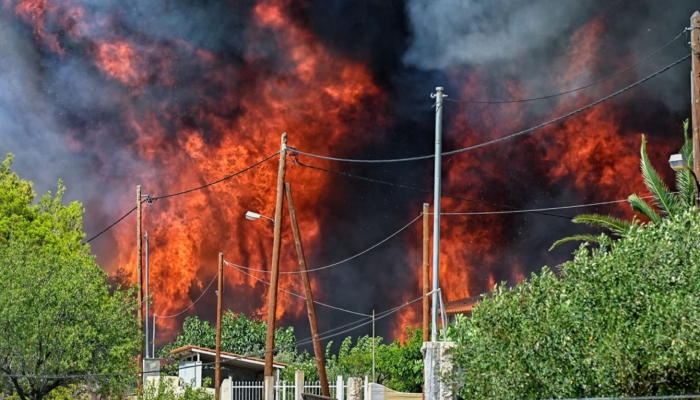Concrete jungle: Why Athens has become hottest capital of world?
The forecast predicts a relentless climb with highs of 40 degrees Celsius (104 Fahrenheit) expected this weekend
Athens, an urban metropolis densely clad in concrete, is gaining notoriety as one of Europe's hottest capitals. Despite its vulnerability to extreme temperatures, the city has fallen short in implementing critical environmental innovations, sounding alarm bells among experts.
Amidst a scorching week in the Greek capital, both residents and visitors find solace only on cafe terraces during the evening as temperatures soar.
The forecast predicts a relentless climb with highs of 40 degrees Celsius (104 Fahrenheit) expected this weekend, prompting authorities to partially close iconic landmarks such as the Acropolis and major parks.
Unfortunately, Athens' rapid urbanization has paved the way for the formation of heat islands, with an alarming scarcity of green spaces contributing to the problem.
The city is severely lacking in parks and trees, resulting in a mere 0.96 square meters of green space per resident—a far cry from the World Health Organization's recommended nine square meters per capita.
Despite being encircled by hills and rivers, concrete structures dominate the cityscape, leaving little room for greenery.
With Central Athens ranking as the second most densely populated area in Europe after Paris, the constant construction projects add further strain. Urban planners lament that Greece's construction boom is the primary hindrance to preserving precious green spaces.
Efforts to combat the environmental crisis have been met with mixed results. While Athens appointed its first climate tsar in 2021 to spearhead climate change adaptation strategies, urbanization projects continue to clash with environmental goals.
Trees have been sacrificed for the sake of new metro stations, and essential green spaces have been delayed due to prolonged construction.
The lack of a cohesive strategy and political will has been a significant obstacle in reversing this disheartening trend.
Environmental experts emphasize the urgency of prioritizing green initiatives and citizen engagement.
Greece's economic crisis has also left its mark, with budget cuts affecting public services and endangering Natura protection areas across the country.
To secure a greener and more sustainable future, Athens must strike a delicate balance between urban development and environmental preservation.
Prioritising green infrastructure, engaging citizens, and fostering a collective commitment to environmental protection are crucial steps towards transforming Athens into a more resilient and environmentally conscious city.
-
Las Vegas father shoots daughter's boyfriend, then calls police himself
-
'Fake' sexual assault report lands Kentucky teen in court
-
Woman arrested months after allegedly staging husband’s murder as suicide
-
Bangladesh sees high turnout in landmark national election
-
Lufthansa cancels hundreds of flights amid pilot and cabin crew strike
-
South Korea ex-interior minister jailed for 7 Years in martial law case
-
UK economy shows modest growth of 0.1% amid ongoing budget uncertainty
-
EU leaders divided over ‘Buy European’ push at Belgium summit: How will it shape Europe's volatile economy?












